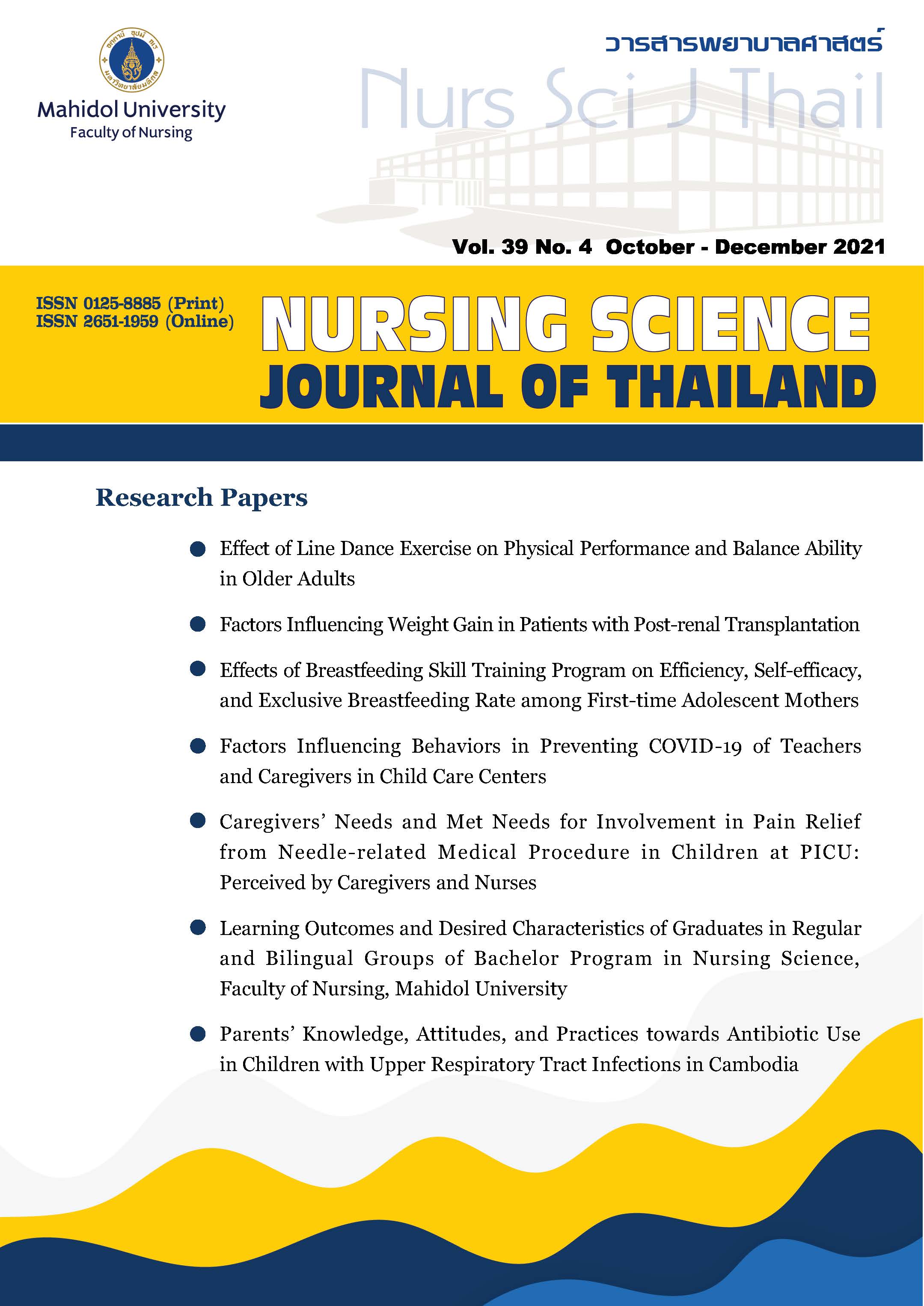Learning Outcomes and Desired Characteristics of Graduates in Regular and Bilingual Groups of Bachelor Program in Nursing Science, Faculty of Nursing, Mahidol University
Main Article Content
Abstract
Purpose: This study aims to examine and compare the learning outcomes and desired characteristics of graduates who enrolled in the regular group and the bilingual group, and describe the learning experiences of the bilingual group.
Design: Descriptive research design.
Methods: Thirty graduates of the regular group and 21 graduates of the bilingual group, who graduated in the 2017 academic year, were selected using convenience sampling. Participants completed two questionnaires: the learning outcomes of the Thai Qualifications Framework of Higher Education, and the desired characteristics of graduates of Mahidol University. Descriptive statistics and Mann-Whitney U Test were used to analyze the quantitative data. Qualitative data on the learning experiences were collected using focus group interviews with graduates in the bilingual group. These data were analyzed using the content analysis method.
Main findings: Between the regular and bilingual groups of participants, there was no difference in the mean scores of the learning outcomes and the desired characteristics of graduates (p > .05). However, graduates of the bilingual group had a higher English proficiency test score for job enrollment at Mahidol University than those of the regular group. Learning experiences from being students in the bilingual group included English skill improvement in classes with no extra cost, increased chance to enroll in the student exchange programs, and learning in a small group with an active learning method. However, the bilingual group has to work hard to comprehend lessons in their classes.
Conclusion and recommendations: Graduates of the bilingual group had a high level of satisfaction in teaching and learning, therefore the program should enroll more students in the bilingual group. The nursing institute should prepare faculty members for this program by enhancing and supporting their English teaching competency. To increase student’s ability in learning English the institute should facilitate environment and activities to promote English communication for students. Pattern of teaching and learning should also be developed for achieving the bilingual students’ needs.
Article Details
Copyright Notice: Nursing Science Journal of Thailand has exclusive rights to publish and distribute the manuscript and all contents therein. Without the journal’s permission, the dissemination of the manuscript in another journal or online, and the reproduction of the manuscript for non-educational purpose are prohibited.

Disclaimer: The opinion expressed and figures provided in this journal, NSJT, are the sole responsibility of the authors. The editorial board bears no responsibility in this regard.
References
Faculty of Nursing, Mahidol University. Handbooks of bachelor of nursing science year 2017. Bangkok: Faculty of Nursing, Mahidol University; 2017. 184 p. (in Thai).
Office of the Education Council, Ministry of Education. National education plan year 2017-2037 [Internet]. Bangkok: Office of the Education Council; 2017 [cited 2018 Mar 9]. Available from: http://backoffice.onec.go.th/uploaded/Outstand/2017-EdPlan60-79.pdf. (in Thai).
Faculty of Nursing, Mahidol University. Program specification of bachelor of nursing science year 2017. Bangkok: Faculty of Nursing, Mahidol University; 2017. 161 p. (in Thai).
Pongmarutai T. Bilingual nursing education for Thailand: facing the challenges head-on. Rangsit Journal of Arts and Sciences. 2013;3(1):79-86. (in Thai).
Ministry of Education. Thai qualifications framework for higher education in nursing science year 2017 [Internet]. Bangkok: Ministry of Education; 2017 [cited 2018 Mar 9]. Available from: https://www.tnmc.or.th/news/18. (in Thai).
Fry GW. The evolution of educational reform in Thailand [Internet]. Bangkok: Office of the National Education Commission; 2002 [cited 2018 Mar 9]. Available from: http://crd.grad.swu.ac.th/data_km/the%20evolution%20of%20education%20in%20thailand.pdf.
Dechipichai P, Pongsopa J, Suwannateep N, Tuprakay SR. The bilingual mathematics learning and teaching management in schools in Bangkok. SDU Research Journal Humanities and Social Sciences. 2016;12(2):61-82. (in Thai).
Daosodsai H, Gajeaseni C. A study of language learning strategies use of students in an English program. in Assumption Samutprakarn school. Princess of Naradhiwas University Journal. 2011;3(3):90-9. (in Thai).
Pongsutirak C. State and problems of English program management of private schools in Nonthaburi and Pathumthai provinces [master’s thesis]. Bangkok: Dhurakij Pundit University; 2009. 102 p. (in Thai).
Turner K, Rakkwamsuk S, Ruanjaiman J, Sukgaroen J, Suriyanimitsuk T. The pedagogical situation fostering 21st century skills of nursing students at Boromarajonani College of Nursing, Chon Buri. Nursing Journal of the Ministry of Public Health. 2016;26(2):128-41. (in Thai).
Krejcie RV, Morgan D. Determining sample size for research activities. Educ Psychol Meas. 1970;30:607-10. doi: 10.1177/001316447003000308.
Burgess A, van Diggele C, Roberts C, Mellis C. Facilitating small group learning in the health professions. BMC Med Educ. 2020;20 Suppl 2:457. doi: 10.1186/s12909-020-02282-3.
Dionne Merlin M, Lavoie S, Gallagher F. Elements of group dynamics that influence learning in small groups in undergraduate students: a scoping review. Nurse Educ Today. 2020;87:104362. doi: 10.1016/j.nedt.2020.104362.
Murry LL, Thomas P, Razdan G, Devi YS, Joshi P, Sharma KK. Engaging nursing students with small group learning in midwifery education. Int J Nurs Educ. 2019;11(1):55-9. doi: 10.37506/ijone.v11i1.4694.
He W, Xu Y, Zhu J. Bilingual teaching in nursing education in China: evolution, status, and future directions. Nurs Health Sci. 2011;13(3):371-7. doi: 10.1111/j.1442-2018.2011.00623.x.


